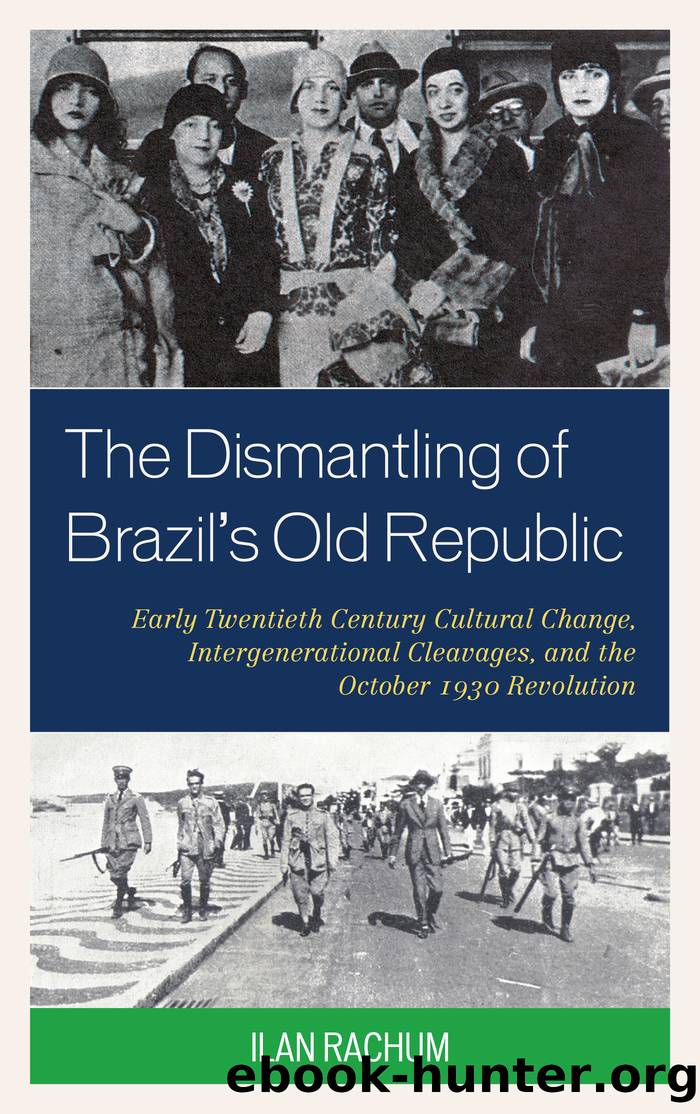The Dismantling of Brazil's Old Republic by Rachum Ilan;

Author:Rachum, Ilan;
Language: eng
Format: epub
Tags: undefined
Publisher: UPA
Published: 2012-08-15T00:00:00+00:00
But what would the program of the revolution be? What kind of Brazil would it substitute for the one that the opposition press charged with tyranny, neglect and corruption? Here of course lay the drawbacks. Although the tone and language used by the opposition press pointed to a program much beyond the liberal state envisioned in the platform of the Democratic Party, this program was not given a concrete, comprehensive, articulated exposition. The reason was plain enough. The opposition press consisted of an association of points of view; it had no formal structure. And there was something else that determined this outcome. The enshrining of Prestes as a revolutionary messiah also obligated the admirers to âhisâ program. They were not inclined to come with something of their own that had not been confirmed by Prestes himself. In this, their predicament resembled that which confronted leading members of the military rebels in relation to Prestes. The result is that rather than a solid program for a revolution, what we can gather from the material published in the opposition press are the main issues that were discussed, which is not exactly the equivalent of a political plan.
One of the important issues to be raised touched the role of foreign investments in Brazil. As we have seen, this issue had also been tackled by the rebel officers, particularly Prestes (though not by Távora). As a matter of fact it was a theme that had been under discussion since before WWI, and soon turned into a favorite argument in the arsenal of the nascent left. As early as 1917, writing in the review O Debate, which at that time served as a forum of expression for Rio's left-leaning intellectuals, the novelist Lima Barreto argued that Brazil faced the threat of foreign economic domination and this could only be resisted through a violent popular reaction.[21] Enunciated at a time when the hands of all the major powers were tied by the war, this sounding of the alarm hardly fitted the circumstances. But in 1923â24, when the newspaper A Nação raised this issue anew, international conditions had changed. The editor, Mauricio de Lacerda, charged former president Epitácio Pessoa with returning Brazil to the position of a debtor state, by contracting unnecessary loans abroad and spending huge sums on ostentatious works, such as the sumptuous celebrations of one century of independence. Citing Alberto Torres as an authority, Lacerda imagined Brazil as âEgypt of the Western Hemisphere,â selling its economic prospects to foreign interests with each new loan undertaken to consolidate previous debts.[22]
After the rescinding of press censorship, similar strictures were leveled at the financial policies of Washington LuÃs (whose finance minister throughout most of 1927 was Getúlio Vargas). The Diário Carioca, not a particularly leftist publication, became adept at connecting foreign loans with the danger of surrendering political independence. According to that paper, most Brazilian public services and many private firms were mortgaged to foreign capital, raising the apprehension that further loans would only lead to the intervention of an imperialist power.
Download
This site does not store any files on its server. We only index and link to content provided by other sites. Please contact the content providers to delete copyright contents if any and email us, we'll remove relevant links or contents immediately.
| Africa | Americas |
| Arctic & Antarctica | Asia |
| Australia & Oceania | Europe |
| Middle East | Russia |
| United States | World |
| Ancient Civilizations | Military |
| Historical Study & Educational Resources |
Cat's cradle by Kurt Vonnegut(15334)
Pimp by Iceberg Slim(14487)
4 3 2 1: A Novel by Paul Auster(12375)
Underground: A Human History of the Worlds Beneath Our Feet by Will Hunt(12085)
The Radium Girls by Kate Moore(12018)
Wiseguy by Nicholas Pileggi(5769)
The Fire Next Time by James Baldwin(5431)
Perfect Rhythm by Jae(5398)
American History Stories, Volume III (Yesterday's Classics) by Pratt Mara L(5299)
Paper Towns by Green John(5177)
Pale Blue Dot by Carl Sagan(4996)
A Higher Loyalty: Truth, Lies, and Leadership by James Comey(4954)
The Mayflower and the Pilgrims' New World by Nathaniel Philbrick(4491)
The Doomsday Machine by Daniel Ellsberg(4484)
Killers of the Flower Moon: The Osage Murders and the Birth of the FBI by David Grann(4435)
The Sympathizer by Viet Thanh Nguyen(4384)
Too Much and Not the Mood by Durga Chew-Bose(4337)
The Borden Murders by Sarah Miller(4312)
Sticky Fingers by Joe Hagan(4188)
